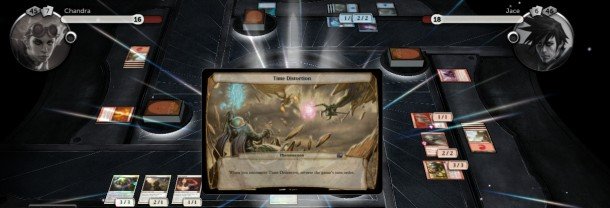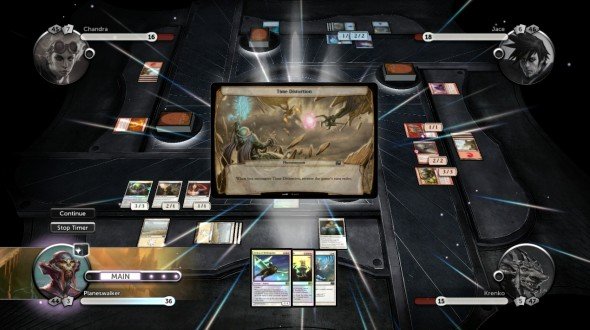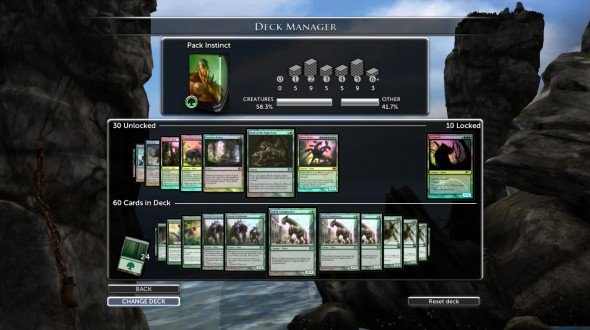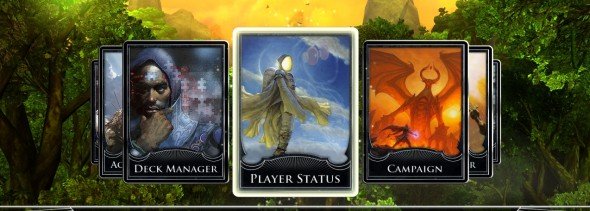8 justifications for Magic: The Gathering — Duels of the Planeswalkers 2013's existence

Despite being announced less than two weeks ago, Magic: The Gathering — Duels of the Planeswalkers 2013 is only two days away from release. Wizards of the Coast hasen't given us a lot of time to weigh the pros and cons of the new game compared to the previous iterations we already own, and everyone I've talked with has told me the same thing: they're happy with the 2012 version and aren't sure why they should pay $10 for this new one.
To be honest, I didn't have a good answer either. So I spent dug into the preview build of Duels of the Planeswalker 2013 this morning to see if it's worth upgrading to. A few matches in, I'm already happy to lay down my $10 to pick it up on Steam . Here's why.
1. Planechase mode is brilliant
The most interesting mode in Duels of the Planeswalkers 2012 was a 3-on-1 mode called Archenemy and, frankly, it's not very fun. Most of our Archenemy matches in the office end with clinical depression, overwhelming hopelessness, and new swear words invented for cursing the AI and its ridiculously OP bonuses. Playing several rounds of Planechase, the new mode added in Duels 2013, I haven't needed to invent a single swear word.
It plays a lot like a regular two-or-four-player match--except that there's a global effect that consistently changes and an added element of luck that can give temporary perks or penalties to specific players. This is due to the added Planeschase deck and die, which sit in the middle of playing area. Each Planeschase card represents a specific region of the game's lore. Magic fans will recognize all of them, while everyone else will skip straight to the effect text, which describes how the game rules are modified while this card is active.
There are 40 different Planeschase cards and the effects are pretty crazy. I've seen planes that reverse the play order, create duplicates of all attacking creatures every time anyone attacks, forces creature sacrifices at the start of each turn, adds Flash to enchantment cards, or gives +1/+1 tokens to any creatures that deal damage to players--these global rule changes are huge and can completely open up new strategies.

In addition to the deck, there's a Planeschase die. Each player can roll it once per turn for free, and pay increasing mana costs for additional rolls each turn. The die is mostly blank and will do nothing most of the time. One side has a Planeschase emblem that causes you to change the active Planeschase card, and a second side has a warp emblem that causes the temporary effect on the Planeschase card. That temporary effect is usually a strong benefit that only affects the player that rolled the die. Some examples I've seen are creating zombie tokens, making all units indestructible for the turn, or sacrifice/tap creatures to deal direct damage to players.
This mode by itself would almost be worth the $10 cost of Duels 2013. It's incredibly fun to play, and rewards quick-thinking and strategic nimbleness, rather than building a gimmicky deck that plays the same every time you use it. It's a perfect addition to the Duels environment, where you use pre-built decks that are generally pretty flexible. I played a few four-players free-for-all games and each one was fun, and had the occasional feeling of camaraderie as everyone roots for a good die roll when you're trapped in an evil Plane that's chewing through everyone's armies. Most importantly, it keeps the matches dynamic and interesting--which is invaluable for a game with a limited number of decks.
Keep up to date with the most important stories and the best deals, as picked by the PC Gamer team.
2. You can pick which mana to tap when playing cards
The only thing more frustrating than Gavin's summon-100-million-elves strategy in Duels 2012 is when the inability to select which mana to tap when playing cards ruins you're perfect plan. We've all been there: you have exactly the right types of mana to play your combo and then the game decides to spend all of your black mana to pay for one colorless card, rendering everything in your hand useless. Although the controls are really clunky, 2013 does let you choose which mana to spend when playing cards.
3. You get to use the 2013 cards first
If you don't play the physical card game, this one's not a big deal for you. The new cards in Duels 2013 are from the Magic 2013 set, which doesn't launch for the tabletop game until July 13. That means people that play Duels will have a solid month of playing with 100 of the new cards—testing them out and learning how to counter them effectively before anyone else. If you're planning to attend a launch night draft party, like a few of us at PCG are, this'll give you a huge advantage over anyone that's just looked at the cards online and is going in blind.
4. You get real cards and real-life stuff
Wizards of the Coast is really pushing to get gamers playing both the digital and tabletop versions of Magic: The Gathering. If the ability to look smart and dominate strangers on July 13th wasn't enough to you to try out the tabletop game, maybe free cards will get you. Every purchase of Duels 2013 on Steam comes with a voucher for a six-card booster with alternate art on a mythic rare (i.e., powerful) card. On top of that, Wizards is going to be hosting an event in September for all Duels players that lets them go to one of 3,000 stores around the US and play with provided Magic decks all day long for free.

5. Deck Management will warn you if you're being stupid
Alright, let's say you have no interest in the physical card game—there are still a few other perks that might make this year's release worth your money. For one, deck management has a lot more analytics to help you make the right tweaks when swapping in optional cards.
It now breaks down your creature:spells ratio to warn you when you're going spell-crazy like I tend to, shows how many cards in each mana cost group you have to help you resist stacking ultra-powerful creatures that leave you defenseless early on, and analyzes each deck on 4 metrics: creature size, deck speed, deck flexibility, and card synergy.
6. New AI difficulty levels let the game scale
In Duels 2012, there's only one difficulty, although it did seem to scale a bit behind the scenes so that it usually provided a decent challenge. 2013 adds two new difficulty levels on top of Normal, one for beginners and one for experts. I wasn't able to test the most difficult level, but the developers promise that it will be significantly more difficult than 2012 and put up a fight for veterans.
On top of the normal modes, 2013 has a whole new heap of Challenges--small scenarios that require sometimes-absurd out-of-the-box thinking to find a survival tactic. I was too impatient to beat all the ones in Duels 2012, so there's no way I'm going to conquer these. But, hey! If you're smarter than me, here's your chance to prove it.

7. It has brought an end (step) to all things
There's an end step now. Frankly, it's pretty silly this wasn't in before--it's a core step in the tabletop game that allows you to play creatures and spells after combat.
8. The campaign has a real story... maybe
Nicol Bolas is not a kid you vaguely remember from elementary school (or maybe he is, I don't know--I probably didn't attend school with you); he's a giant dragon that wants power . His official bio also says that he's survived "multiple cataclysms," so suck on that, Deathwing . While I wasn't able to play much of the campaign in the preview build, I did get a chance to see some of the cutscene videos that will be prevalent in it. They reminded me of Guild Wars 2's, using animated concept art in heavily stylized narratives.
The story revolves around Nicol Bolas showing up and doing something sinister, threatening, and probably dastardly. It's your job to cruise through the different planes, bashing down Planeswalkers until you get Nicol's attention and inevitably thwart his plan. But even if you stopped caring about malevolent dragons years ago, the mechanics of the campaign sound interesting. Each match will have a unique mechanic themed after your opponent. For example, a fight in the green plane is all about animal stampedes: your opponent will play progressively larger creatures every turn and then play overrun, which causes all creatures to get stronger and charge. Another fight will have one hawk creature played every turn, in addition to whatever else the opponent feels like doing.
It remains to be seen if that makes the enemy too predictable or not, but it should at least ensure that your tactics, and possibly deck, will have to change for each fight--something I was able to completely avoid in Duels 2012 by just pumping out artifact creatures 'til the bad guys die.

